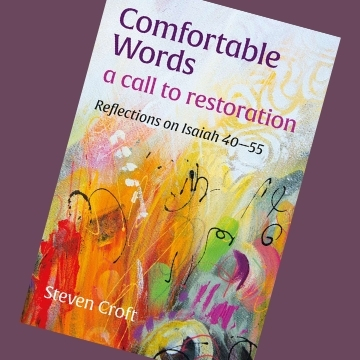During the past year we have all been through so much, together and individually. Not on our own, but with God. BRF author Gordon Giles reminds us that God has always provided deliverance, escape, rescue and redemption for his people. And through the cross and resurrection, he still does today.
4 April 2021
On 23 March the nation observed a day of reflection marking a year since the initial lockdown. It was poignant to look back at months of isolation, shielding and apprehension for most, agony and grief for some, and exhaustion and stress for many who had worked the whole year as key workers.
God with us through the floods
It is not the first time we have taken stock of the journey taken. In May 2020 we passed the relatively early, but noticeable milestone of 40 days and nights of lockdown, and the comparison with Noah and the ark seemed apposite.
The flood actually continued unabated for another five months (Genesis 7:24), and it was not until the seventh month that the ark ‘landed’ on Mount Ararat (Genesis 8:4), such that the duration of the Noah family’s isolation in the ark at sea and on land amounted to eleven months (Genesis 8:14–16). Would that our restrictions had only lasted eleven months! The flood of death and sorrow continues, ebbing and flowing in tides of infection or restriction.
Sustained through the valley of death
We have now passed two Easters in lockdown, but tens of thousands have not. We have walked through the valley of death with them, in great sorrow. Yet that valley of death can be put into the context of the resurrection hope we have in Jesus Christ.
Unsurprisingly Psalm 23 has been on many lips: a psalm of sorrow, trust, hope and love. Many of us – too many – have walked the valley of death. But we have been sustained in the centre of our being by this comforting psalm about divine love. For wherever we walk, we never walk alone. God is with us. God restores our soul from within. God leads us, and his love and provision for us overflow with goodness and mercy.
‘Wherever we walk, we never walk alone.’
Psalm 23 is thoroughly human, yet it points inwards to the divine within us. The Lord is my shepherd, he makes me to lie down in green pastures. Usually, in church we sing about God or to God. And yet there is that mention in the middle: for ‘you’ are with me, ‘your rod and staff comfort me’.
And that is the key to recognising and addressing the God who dwells in each of us, who by his Spirit, comforts and leads us through the darkest times, even through the valley of death.
Psalm 23 has sustained us recently. Perhaps it sustained Jesus himself as he walked through the valley of death towards the goodness and mercy of Easter resurrection.
Led through the doors of a tomb
Psalm 23 is not only about God who leads his people through deadly and dangerous times to safety. It is also about Christ, the good shepherd, who leads God’s people through the doors of a stone-cold sealed tomb to the warmth and light of resurrection beyond. We can read the psalm as Christians facing the trials and tribulations of Covid-19.
Henry Baker’s hymn version, ‘The King of Love My Shepherd Is’, makes all this clear, as it is actually about Jesus, who is not only the good shepherd but the king of love.
Jesus is also the sheep, the paschal lamb, whose death on the cross at Passover symbolises the second exodus. For in the death and resurrection of Jesus, we are reminded of the parting of the sea for the Israelites to cross.
Rescued from slavery
It is a story of deliverance, escape, rescue, redemption. In this second exodus, God’s people are released not from Egyptian slavery, but from the slavery of sin, redeemed on the cross and raised up on the third day.
At the first Passover, Moses and his people ate their meal hurriedly and fled from Egyptian slavery. At the sea, the waves parted and the people were able to cross. The pursuing Egyptians, on the other hand, were engulfed by the returning floodwaters. As we have been experiencing lockdowns and looking forward to release from coronavirus restrictions, the idea of liberation across an outgoing tide of regulations resonates today.
‘It is a story of deliverance, escape, rescue, redemption.’
This deliverance, escape, rescue and redemption from slavery connects the relationship created by God with Noah, Abraham and Moses to the New Testament or covenant, ministered by and through Jesus Christ. As a second Moses, he leads his people to freedom. The seawaters of death become the flowing waters of baptism into new life. Jesus saves the world by leading us through the darkness of death to resurrection light. And he parts the waters of death, by dying and rising again.
A greater deliverance
Easter is a second exodus – a second and greater deliverance and rescue. It is a wider and deeper sea that Jesus leads us all across. And he does it on the cross.
This is the greater hope which we have held this past year and continue to hold. It is both fragile and strong, for it bears us not only through the valley of death, but into the merciful goodness of comfort and joy in resurrection life.

Gordon Giles is canon chancellor of Rochester Cathedral. He is the author of several books, including At Home in Advent, and At Home in Lent, which has seen a surge in popularity during the lockdown of 2021.

Comfortable Words
In Isaiah 40—55, an unnamed prophet sings at the end of the exile to call God’s people home. Through nine reflections, Steven Croft, bishop of Oxford, examines what these ‘comfortable words’ have to say to us today.
